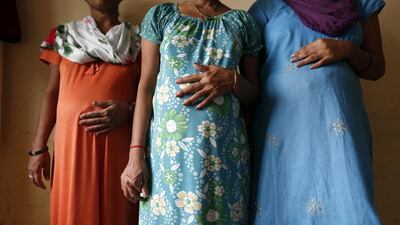When Shabnam Khatim moved to Delhi from her hometown of Gorakhpur, Uttar Pradesh, she met her pregnant neighbour. She did not think much of it until the neighbour told her that the baby was not her own.
The woman was a surrogate – someone who, for a fee, contracts to carry to term a fertilised egg for another couple.
“She only told me about this,” Ms Khatim said.
Many of the couples who use such a service are from overseas. According to 2012 figures from a business body called the Confederation of Indian Industry (CII), about 10,000 foreign couples visited India to find surrogacy services.
The body estimated that the fertility tourism industry generated about US$2.3 billion (Dh8.44bn) a year.
But New Delhi is moving to ban foreigners from availing of surrogacy services in the country, on the grounds that they exploit Indian women and introduce a commercial element into a medical treatment.
Ms Khatim and her family live in Govindpuri, a crowded area in south-central Delhi.
She and her husband have two children of their own, but her husband, a tailor, struggles to make ends meet. He earns, on average, 8,000 rupees (Dh440) a month.
Two years ago, after she understood more about the nature of surrogacy, Ms Khatim decided she would undertake it.
“I explained it to my husband, and we both agreed. We needed the money.”
All told, she stood to earn 350,000 rupees from it – a small windfall for her family.
With her neighbour’s help, Ms Khatim signed up with an agency, and examined the clinic that would tend to her during her pregnancy.
All her medical costs during the nine-month period would be borne by the parents, she was told.
Out of the 350,000 rupees she was promised, she received 10,000 rupees every month for food, to ensure that her nutrition levels remained high. The rest of the money was given to her in three instalments.
Ms Khatim was perhaps unusually well prepared when she began the process.
Dr Manasi Mishra, who heads the research division of the New Delhi-based Centre for Social Research (CSR), said that surrogate mothers rarely have copies of their contracts or know what benefits they are entitled to.
“So they don’t know, for example, that they will have to go through a Caesarean operation, or that if they get gestational diabetes or hypertension they will be tended to at their own cost,” she said.
Ms Khatim was also fortunate in being matched with a caring couple from the United States.
“They used to come to India from time to time, and they sent me greeting cards and chocolates,” she said. “They loved me and respected me.”
Throughout her pregnancy she knew that she would have to give away the baby once she delivered.
“We had to prepare ourselves,” she said. “We always knew that this baby wasn’t mine. We learnt to see it as a job.”
After Ms Khatim gave birth, the couple she surrogated for flew to India to collect the baby.
“I remember when they saw the baby, they were so joyous. They blessed me with all their heart.”
For this reason, she said, “I tell people that this is a happy job. It makes people happy. It’s not just earning. There is a certain joy to it”.
Since her delivery, Ms Khatim has recommended surrogacy to other women in need of money as well. “The money helped us a lot.”
Had she heard that the government was trying to impose a ban upon foreigners paying Indian women to act as surrogates? “I have heard it, but I hope this source of employment does not stop.
“I come to the fertility centre, and I see so many people who come here from so many places, to take up this job,” Ms Khatim said.
“We all need this. It is a good job. It can help a lot of families in need, on both sides – people who need the money and people who want to have babies.”
ssubramanian@thenational.ae

